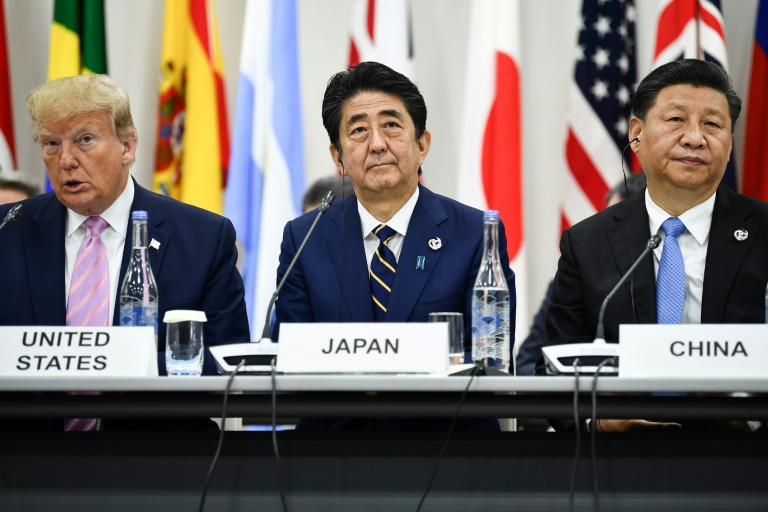
OSAKA: After a first day dominated by public shows of bonhomie, all eyes at the G20 on Saturday turn to a pivotal trade showdown between economic rivals China and the United States.
US President Donald Trump and China's Xi Jinping meet at around 11.30am (9.30am Thailand time) in a bid to thrash out a truce in a long-running trade war that has seen hundreds of billions of dollars in tit-for-tat tariffs.
Trump has said he expects a "productive" meeting but warned before the summit he was prepared to slap tariffs on all Chinese imports if no deal could be struck on the sidelines of the G20.
"It's going to come out, hopefully, well for both countries. And ultimately, it will work out," Trump said on the eve of the talks, adding however that he had given Xi no promises that he would hold off on imposing tariffs.
The best-case scenario most analysts expect is a truce and agreement to keep talking, although markets are not ruling out a complete collapse or a surprise breakthrough given the US president's mercurial nature.
"It is clear that the issue that is dominating is precisely what is going to happen at this meeting tomorrow and everything else becomes secondary," Thomas Bernes from the Centre for International Governance Innovation told AFP.
The first tete-a-tete between the leaders of the world's top two economies since the last G20 in December has cast a long shadow over this year's gathering in Osaka, where differences over climate change have also been laid bare.
The pair were strategically seated opposite each other at Friday's working dinner after a day during which Trump took a broadly conciliatory tone.
China's state-run Xinhua news agency said the head-to-head was a "unique opportunity for the two sides to find new common ground in easing trade tensions and bring the troubled ties back onto the right track."
However, the commentary also warned the US "needs to place itself on an equal footing with China" and "accommodate China's legitimate concerns."
Economists warn that a lengthy trade war could be crippling for the global economy as a time when headwinds such as increased geopolitical tensions and Brexit are blowing hard.
HEATWAVE
Trade will be far from the only contentious issue on the table, with climate change emerging as another sticking point.
As a heat wave sweeps through Europe, Japan is hoping to bridge the gaps between EU leaders who want strong action and an American administration committed to withdrawing from the Paris climate agreement.
Several diplomatic sources said Washington was trying to bring some countries over to its side and appeared less isolated than before on environmental issues.
And Japanese officials admit that achieving consensus on a final statement on climate change will require Herculean diplomatic skills.
Diplomats were expected to work through the night to forge a consensus with almost no language on climate change yet agreed and doubts lingering over whether a final statement would even see the light of day.
Several experts said the focus on Trump and the talks with China struck at the heart of the G20 format, created to craft a united global response to the Lehman Brothers crisis.
"With much of the fate of the global economy and the likely direction of markets hanging on the outcome of this pivotal Trump-Xi meeting, we think things will get worse before they get better," said ING Economics.
Given the focus on bilateral meetings on the sidelines of the G20, analyst Bernes said the Osaka summit once again sparked doubts about the future of the gathering.
"The G20 was created as a forum for cooperation and the question may well be 'have we reached the point where it can no longer serve that purpose'," he told AFP.